Critical thinking is the analysis of available facts, evidence, observations, and arguments in order to form a judgement by the application of rational, skeptical, and unbiased analyses and evaluation. The application of critical thinking includes self-directed, self-disciplined, self-monitored, and self-corrective habits of the mind, thus a critical thinker is a person who practices the skills of critical thinking or has been trained and educated in its disciplines. Philosopher Richard W. Paul said that the mind of a critical thinker engages the person's intellectual abilities and personality traits. Critical thinking presupposes assent to rigorous standards of excellence and mindful command of their use in effective communication and problem solving, and a commitment to overcome egocentrism and sociocentrism.

The International Association for the Evaluation of Educational Achievement (IEA) is an independent, international cooperative of national research institutions and governmental research agencies. It conducts large-scale comparative studies of educational achievement and other aspects of education.
Information and communications technology (ICT) is an extensional term for information technology (IT) that stresses the role of unified communications and the integration of telecommunications and computers, as well as necessary enterprise software, middleware, storage and audiovisual, that enable users to access, store, transmit, understand and manipulate information.
Technology education is the study of technology, in which students "learn about the processes and knowledge related to technology". As a field of study, it covers the human's ability to shape and change the physical world to meet needs, by manipulating materials and tools with techniques. It addresses the disconnect between wide usage and the lack of knowledge about technical components of technologies used and how to fix them. This emergent discipline seeks to contribute to the learners' overall scientific and technological literacy, and technacy.

Computer literacy is defined as the knowledge and ability to use computers and related technology efficiently, with skill levels ranging from elementary use to computer programming and advanced problem solving. Computer literacy can also refer to the comfort level someone has with using computer programs and applications. Another valuable component is understanding how computers work and operate. Computer literacy may be distinguished from computer programming, which primarily focuses on the design and coding of computer programs rather than the familiarity and skill in their use. Various countries, including the United Kingdom and the United States, have created initiatives to improve national computer literacy rates.
The Education Quality and Accountability Office (EQAO) is a Crown agency of the Government of Ontario in Canada. It was legislated into creation in 1996 in response to recommendations made by the Royal Commission on Learning in February 1995.

The National Assessment of Educational Progress (NAEP) is the largest continuing and nationally representative assessment of what U.S. students know and can do in various subjects. NAEP is a congressionally mandated project administered by the National Center for Education Statistics (NCES), within the Institute of Education Sciences (IES) of the United States Department of Education. The first national administration of NAEP occurred in 1969. The National Assessment Governing Board (NAGB) is an independent, bipartisan board that sets policy for NAEP and is responsible for developing the framework and test specifications.The National Assessment Governing Board, whose members are appointed by the U.S. Secretary of Education, includes governors, state legislators, local and state school officials, educators, business representatives, and members of the general public. Congress created the 26-member Governing Board in 1988.
Technological literacy is the ability to use, manage, understand, and assess technology. Technological literacy is related to digital literacy in that when an individual is proficient in using computers and other digital devices to access the Internet, digital literacy gives them the ability to use the Internet to discover, review, evaluate, create, and use information via various digital platforms, such as web browsers, databases, online journals, magazines, newspapers, blogs, and social media sites.
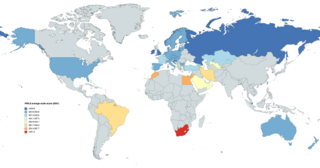
The IEA's Progress in International Reading Literacy Study (PIRLS) is an international study of reading (comprehension) achievement in 9-10 year olds. It has been conducted every five years since 2001 by the International Association for the Evaluation of Educational Achievement (IEA). It is designed to measure children's reading literacy achievement, to provide a baseline for future studies of trends in achievement, and to gather information about children's home and school experiences in learning to read.
Accelerated Reader is a website used to assist students with reading skills. It is a digital program aiming to help students and teachers manage and monitor independent reading practice in English and Spanish. Students pick a book at their own level and read it at their own pace. When a student finish their book, they take a short quiz on the computer to check their understanding. As students read and take quizzes, they receive points depending on the book's reading level. The more difficult the book is, the more points the students receive. AR also tracks the students' progress towards their individualized Accelerated Reader goals.

Digital literacy is an individual's ability to find, evaluate, and communicate information using typing or digital media platforms. It is a combination of both technical and cognitive abilities in using information and communication technologies to create, evaluate, and share information.
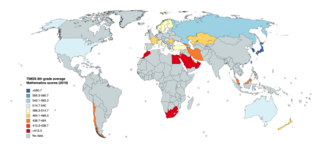
The IEA's Trends in International Mathematics and Science Study (TIMSS) is a series of international assessments of the mathematics and science knowledge of students around the world. The participating students come from a diverse set of educational systems in terms of economic development, geographical location, and population size. In each of the participating educational systems, a minimum of 4,000 to 5,000 students is evaluated. Contextual data about the conditions in which participating students learn mathematics and science are collected from the students and their teachers, their principals, and their parents via questionnaires.

Information and media literacy (IML) enables people to show and make informed judgments as users of information and media, as well as to become skillful creators and producers of information and media messages. IML is a combination of information literacy and media literacy. The transformative nature of IML includes creative works and creating new knowledge; to publish and collaborate responsibly requires ethical, cultural and social understanding.
The professional skills tests, also known as the QTS Skills Tests, were computer-based tests in literacy and numeracy which were required to be passed by anyone attempting to gain qualified teacher status (QTS) in England until March 2020. The tests must be passed before enrolling onto an initial teacher training course, such as the Postgraduate Certificate in Education (PGCE), or the Bachelor of Education (BEd).
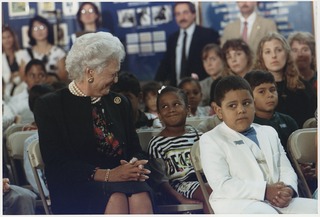
Literacy in the United States was categorized by the National Center for Education Statistics into different literacy levels, with 92% of American adults having at least "Level 1" literacy in 2014. Nationally, over 20% of adult Americans have a literacy proficiency at or below Level 1. Adults in this range have difficulty using or understanding print materials. Those on the higher end of this category can perform simple tasks based on the information they read, but adults below Level 1 may only understand very basic vocabulary or be functionally illiterate. According to a 2020 report by the U.S. Department of Education, 54% of adults in the United States have English prose literacy below the 6th-grade level.

In the Dominican Republic, education is free and compulsory at the elementary level, and free but non-mandatory at the secondary level. It is divided into four stages:
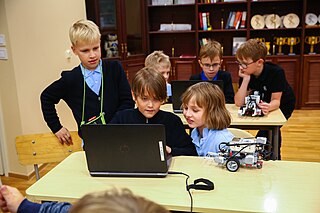
Computer science education or computing education is the field of teaching and learning the discipline of computer science, and computational thinking. The field of computer science education encompasses a wide range of topics, from basic programming skills to advanced algorithm design and data analysis. It is a rapidly growing field that is essential to preparing students for careers in the technology industry and other fields that require computational skills.
Ronald Eugene Anderson, also known as Ron Anderson, was an American sociologist. He was a Professor Emeritus at University of Minnesota in Twin Cities where he taught sociology from 1968 to 2005. His early work focused on social and institutional factors shaping the diffusion of technology-based teaching. Since 2007, his work has focused on web-based compassion and world suffering.
The Programme for the International Assessment of Adult Competencies (PIAAC) is a worldwide study by the Organisation for Economic Co-operation and Development (OECD) in 24 countries of cognitive and workplace skills. The main aim is to be able to assess the skills of literacy, numeracy and problem solving in technology-rich environments, and use the collected information to help countries develop ways to further improve these skills. The focus is on the working-age population. The first data was released on October 8, 2013. A new PIAAC survey is expected to be published in 2021/2022.
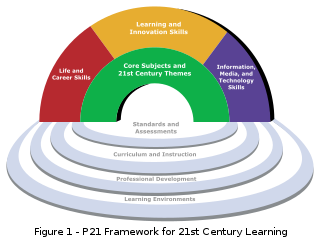
21st century skills comprise skills, abilities, and learning dispositions that have been identified as being required for success in 21st century society and workplaces by educators, business leaders, academics, and governmental agencies. This is part of a growing international movement focusing on the skills required for students to master in preparation for success in a rapidly changing, digital society. Many of these skills are also associated with deeper learning, which is based on mastering skills such as analytic reasoning, complex problem solving, and teamwork. These skills differ from traditional academic skills in that they are not primarily content knowledge-based.
 Buenos Aires, Argentina
Buenos Aires, Argentina Australia
Australia Chile
Chile Croatia
Croatia Czech Republic
Czech Republic Denmark
Denmark Germany
Germany Hong Kong
Hong Kong Lithuania
Lithuania Netherlands
Netherlands Norway (grade 9 only)
Norway (grade 9 only) Newfoundland and Labrador and Ontario, Canada
Newfoundland and Labrador and Ontario, Canada Poland
Poland Russian Federation
Russian Federation Slovak Republic
Slovak Republic Slovenia
Slovenia South Korea
South Korea Switzerland
Switzerland Thailand
Thailand Turkey
Turkey Chile
Chile Denmark
Denmark Finland
Finland France
France Germany
Germany Italy
Italy Kazakhstan
Kazakhstan South Korea
South Korea Luxembourg
Luxembourg Portugal
Portugal Moscow, Russia
Moscow, Russia Uruguay
Uruguay United States
United States









